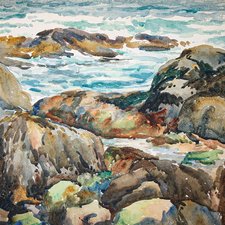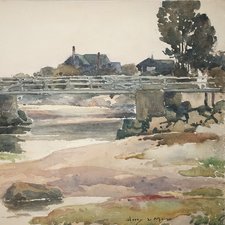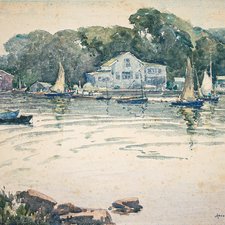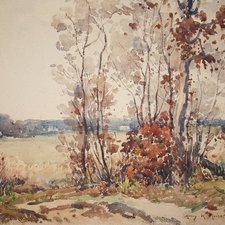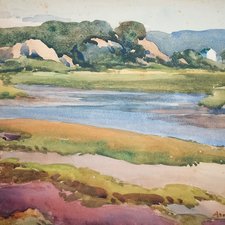Harry DeMaine
1880 - 1952
Harry DeMaine was born December 23, 1880 in Liverpool, England, the eighth child of Joseph DeMaine and Jane Whittaker DeMaine. Harry worked in a dry goods store in Liverpool from 1895 to 1908. In 1902, he enrolled in evening classes at the Liverpool City School of Art, his first formal art instruction working in pastel and watercolor. In 1908, at the age of 28, DeMaine received a scholarship to attend the London School of Art where he studied for a brief time with Frank Vango Burridge (1869-1945). That same year he traveled to Paris where he attended classes at the Academie Julian and the Academie Colarossi. It was probably during this time that DeMaine made personal connections that induced him to join the American Field Service and later, provided him with artist connections when he arrived in America. By the outbreak of the First World War, Harry DeMaine was devoted full time to painting.
In September 1914, Harry DeMaine volunteered for the American Field Service (AFS), an American led ambulance service which worked with the French army. DeMaine initially worked from the American Hospital in Neuilly-sur-Seine just outside Paris; beginning in early 1916 he took a post in the AFS headquarters at 21 Rue Raynouard as assistant to Inspector-General A. Piatt Andrew. DeMaine's service in the AFS ran from September 1914 to January 1917. In February 1917, DeMaine joined British Expeditionary Force in Paris and shortly thereafter the King's Royal Rifles. He was discharged from service in the spring of 1919. Later that year, DeMaine came to the United States, traveling with AFS materials being sent from Paris.
By the early 1920s, DeMaine was working in Boston and New York as a landscape painter. His preferred medium was watercolor. DeMaine discovered Gloucester quickly as an exhibition held at the Grace Horne gallery in Boston in November 1921 included works done on Cape Ann and photographs in the DeMaine family's collection taken either 1920 or 1921 show DeMaine in Gloucester in the company of fellow artists Max Levy, Leonard Craske, Hobart Nichols and Dorothy (Levy) Rolfe. That same year, Harry had his first solo show in America and in 1923, he was elected to the New York Water Color Club.
In 1928, Harry DeMaine and Lucy Bigelow MacDonald were married in New York. Lucy was from Gloucester though she and Harry had met in Paris where she also worked for the AFS and specifically Henry Davis Sleeper. (Both Sleeper and A. Piatt Andrew were longtime summer residents of Gloucester.) They had one son and settled in New York. Harry traveled to Gloucester often during the summers to paint, but it wasn’t until 1937 that the whole family came, renting a cottage on Rocky Neck in East Gloucester. On Cape Ann, Harry became close with artists Gordon Grant (1875-1962), Ted Kautsky (1896-1953), Roy Wilhelm (1895-1954), Jerri Ricci (1916-1995) and Arnold Knauth (1918-2017).
Although primarily a watercolorist, Harry DeMaine also worked in oil, and at various times made woodblock prints, posters, textiles and murals. Back in New York, he was involved with the Salmagundi Club, serving on both the hanging committee and as an exhibit juror. He exhibited there as well, showing 59 oils and 99 watercolors between 1920 and 1952. The late 1930s and 1940s were his most prolific watercolor years, during which time he also maintained a studio/gallery in East Gloucester at 258 East Main Street. Despite this prolific period occurring at a time when modern attitudes toward art were beginning to catch on, Harry never developed a modernist style. Despite this, he got on well with other artists, and held memberships with both the North Shore Arts Association and the Rockport Art Association. He even participated in theater productions at the Gallery-on-the-Moors in East Gloucester.
In 1950, Harry and Lucy bought a summer cottage at 1 Ledge Road in East Gloucester, dubbing it “Little Zero.” The following year, Harry was elected as an Associate in the National Academy of Design.
